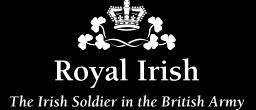89th Regiment land at Balaclava, Irish in the Crimean War.

|
| The 89th Regiment in the Crimea. |
The Russians in the Crimea were securely established in their fortress-port of Sebastopol with the Allies faring less well as they occupied entrenched positions on the bleak plateau facing the Russian lines. The Allies remained in this exposed location awaiting spring when they hoped the weather would permit them to launch an offensive.
It was into this misery of a Crimean winter that the 89th (Princess Victoria's) Regiment of Foot disembarked at an overcrowded Balaclava on 17 December 1854, coming under command of the 3rd Division commanded by Major General Sir Richard England. The Battalion had embarked on the S.S. Niagara in Gibraltar on 2 December with a strength of 25 officers and 688 men. So harsh were the conditions that within the first two weeks 45 men died, with another 36 dying in January 1855. The Regiment was (eventually) distinguished with the Battle Honour SEVASTAPOL. The conditions at Balaklava were described by a constable of the Royal Irish Constabulary* who wrote:
'The weather, as yet, is not colder than in Ireland, but when a man gets wet to the skin, he has no place to go to but a cold tent; and when he gets up in the morning he must go about collecting wood to boil his breakfast; which consists of green coffee, which must be roasted on the stable shovel, pounded and thrown into the water; that, with some biscuit, is our breakfast; biscuit and salt beef for dinner; and supper same as breakfast. We get two glasses of rum every day, which is chiefly the thing that keeps life in us, but we hope it won’t be always as bad as it is now. If Sevastapol was once taken our condition would be better. Why, if it is not taken, and that the troops have to winter here, history will record another 1812'.
The Armagh Light Infantry, later the 3rd Battalion The Royal Irish Fusiliers, although embodied for ‘Home Service’ on 27 December 1854 with 407 men volunteering for active service, also sent drafts to other regiments as follows::
68th Light Infantry (The Durhams) - 209
46th Regt. (2nd Batt. Duke of Cornwall's Light Infantry) - 74
Royal Artillery - 71
22nd Regiment (The Cheshire Regiment) - 14
The Coldstream Guards - 12
The 7th Hussars - 8
27th Foot (The Royal Inniskilling Fusiliers) - 6
The 60th Rifles (The King's Royal Rifle Corps) - 10
The 80th Regiment (2nd Battalion South Staffordshire Regt) - 1
The 25th Regiment (The King's Own Scottish Borderers) - 1
The 4th Foot (The King's Own Royal Regiment) - 1
In Ireland there was much public interest in both the regiments and the men and women departing for the Crimea. This was due to the great number of Irishmen recruited in Ireland and serving in the British army. Irish-born soldiers serving in 1854 constituted some 30–35 per cent of the army, and it is estimated that by the end of the war, around 30,000 Irish soldiers had served in the Crimea. It was a sailor, Charles Lucas, an Irishman from Poyntzpass, County Armagh, who won the very first Victoria Cross; it was awarded for his gallantry during a Royal Navy action against the Russians in the Baltic in 1854. In total, 28 men of Irish birth were awarded the Victoria Cross during the Crimean War.
*
The Royal Irish Constabulary had volunteered men and mounts to provide a Mounted Staff Corps, the forerunners of the Royal Military Police who inherited the colour 'red' from the RIC’s ceremonial facings. The Mounted Staff Corp’s task was to protect the logistic supplies of the Commissariat.





